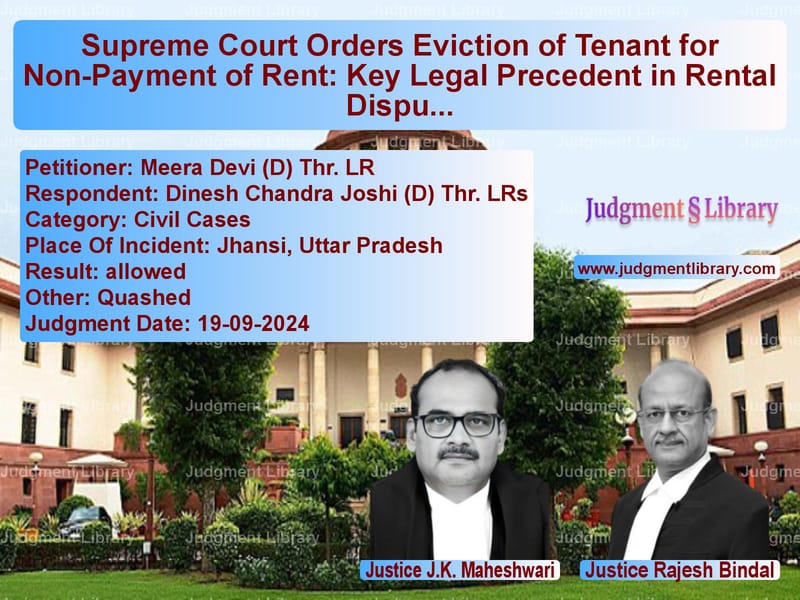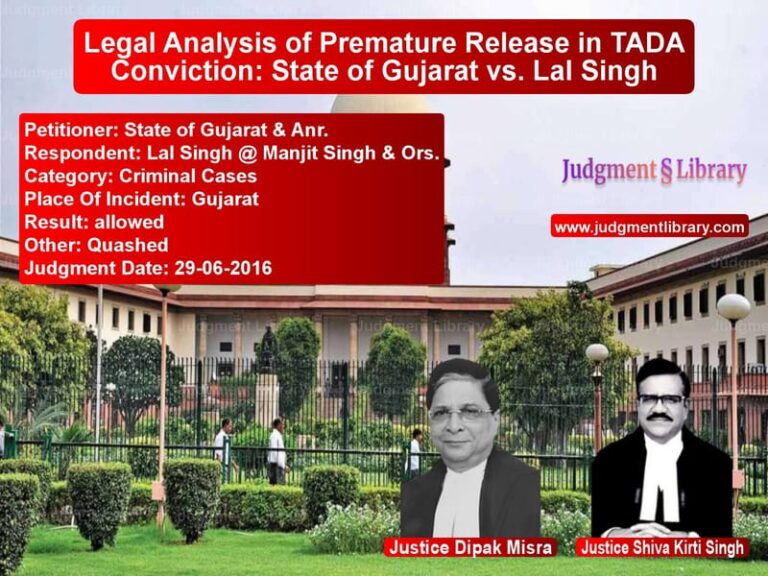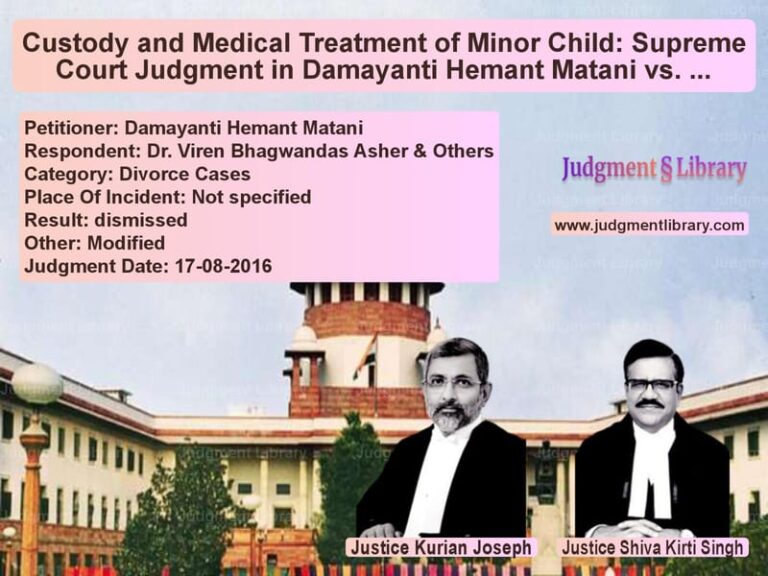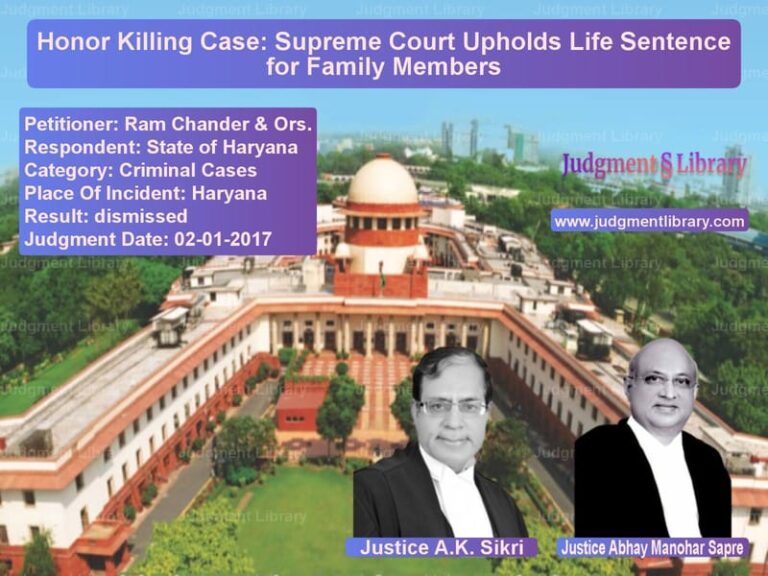Supreme Court Orders Eviction of Tenant for Non-Payment of Rent: Key Legal Precedent in Rental Disputes
The case of Meera Devi (D) Thr. LR vs. Dinesh Chandra Joshi (D) Thr. LRs is a landmark ruling on tenant eviction due to non-payment of rent. The Supreme Court ruled that tenants must fulfill their rental obligations during litigation and upheld the eviction order against the tenant for defaulting on rent payments. This ruling reinforces the rights of landlords and clarifies the legal position on defaulting tenants.
For years, courts have addressed issues concerning rental disputes, but this ruling sets a precedent by emphasizing that a tenant’s failure to comply with rent payments during pending litigation can justify eviction. The case serves as a reminder that courts can consider subsequent defaults beyond the initial cause of action when ruling on eviction matters.
Background of the Case
The legal dispute involved the appellant, Meera Devi, the owner of House No. 129 in Laxmi Gate, Jhansi, and the respondent-tenant, Dinesh Chandra Joshi. The tenant occupied the premises under a rental agreement but failed to pay rent for several years. The appellant initiated legal proceedings after the respondent-tenant stopped making rental payments from September 14, 1991.
Key developments in the case:
- November 15, 1997: The landlady issued a legal notice under Section 106 of the Transfer of Property Act, 1882, demanding rent payment.
- December 15, 1997: The respondent-tenant failed to comply, leading to the filing of an eviction suit under SCC Suit No. 107 of 1997.
- Trial Court Decision: The tenant was directed to vacate the premises within one month and pay ₹50 per month as compensation.
- Revisional Court (Jhansi): The court found that the tenant’s deposit of arrears under Section 30(2) of the Uttar Pradesh Urban Buildings (Regulation of Letting, Rent, and Eviction) Act, 1972 was not valid.
- Allahabad High Court: The tenant challenged the order and secured relief, leading to the dismissal of the eviction order.
- Supreme Court: The landlady filed an appeal challenging the High Court’s ruling, which resulted in this landmark decision.
Legal Arguments
Arguments by the Appellant (Landlady – Meera Devi)
- The tenant defaulted on rent payments for an extended period, breaching his legal obligations.
- The deposit of arrears under Section 30(2) of the UP Rent Act was invalid and could not be used to justify continued occupation.
- The tenant was ordered to pay ₹4,000 per month as interim rent during litigation but failed to comply after March 2017.
- Failure to pay rent during pending litigation constitutes a fresh default, justifying immediate eviction.
Arguments by the Respondent (Tenant – Legal Representatives of Dinesh Chandra Joshi)
- The tenant had deposited rent in court as per legal provisions and was not in default.
- The eviction order was excessive and went against the tenant’s rights under the UP Rent Act.
- The Allahabad High Court had correctly ruled in favor of the tenant by dismissing the eviction order.
Supreme Court’s Observations
The Supreme Court analyzed the legal provisions concerning rent payment obligations, eviction laws, and compliance with court orders.
1. Can a Tenant Be Evicted for Non-Payment of Rent During Litigation?
The Court ruled that tenants are legally bound to continue paying rent during the litigation period. Courts are authorized to take subsequent defaults into account when deciding eviction cases.
“In any rent proceeding, the Courts can always take the subsequent facts into consideration, which may be relevant.”
2. Did the Tenant Comply with Court Orders on Rent Payment?
The Court found that the tenant had failed to comply with an earlier order issued on May 2, 2014, requiring him to pay ₹4,000 per month as rent.
“The respondent-tenant has failed to comply with the order of this Court directing payment of rent at the rate of ₹4,000 per month from March 2017 onwards.”
3. Can Courts Consider Post-Litigation Defaults in Rental Disputes?
The Court ruled that failure to pay rent during litigation is a valid reason for eviction.
“Even on failure to pay the rent during the pendency of the litigation, the tenant is bound to be evicted.”
Final Verdict
The Supreme Court issued the following directives:
- The Allahabad High Court’s judgment was set aside.
- The tenant was ordered to vacate the property immediately.
- The landlady was granted the right to recover unpaid rent from March 2017 onward.
- The eviction order was declared final and non-challengeable.
This ruling reinforces landlord rights and serves as a precedent ensuring that tenants cannot indefinitely delay rent payments under the guise of legal proceedings.
Petitioner Name: Meera Devi (D) Thr. LR.Respondent Name: Dinesh Chandra Joshi (D) Thr. LRs.Judgment By: Justice J.K. Maheshwari, Justice Rajesh Bindal.Place Of Incident: Jhansi, Uttar Pradesh.Judgment Date: 19-09-2024.
Don’t miss out on the full details! Download the complete judgment in PDF format below and gain valuable insights instantly!
Download Judgment: meera-devi-(d)-thr.-vs-dinesh-chandra-joshi-supreme-court-of-india-judgment-dated-19-09-2024.pdf
Directly Download Judgment: Directly download this Judgment
See all petitions in Landlord-Tenant Disputes
See all petitions in Property Disputes
See all petitions in Debt Recovery
See all petitions in Judgment by J.K. Maheshwari
See all petitions in Judgment by Rajesh Bindal
See all petitions in allowed
See all petitions in Quashed
See all petitions in supreme court of India judgments September 2024
See all petitions in 2024 judgments
See all posts in Civil Cases Category
See all allowed petitions in Civil Cases Category
See all Dismissed petitions in Civil Cases Category
See all partially allowed petitions in Civil Cases Category







